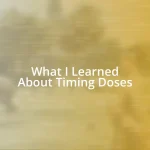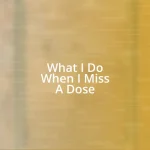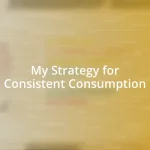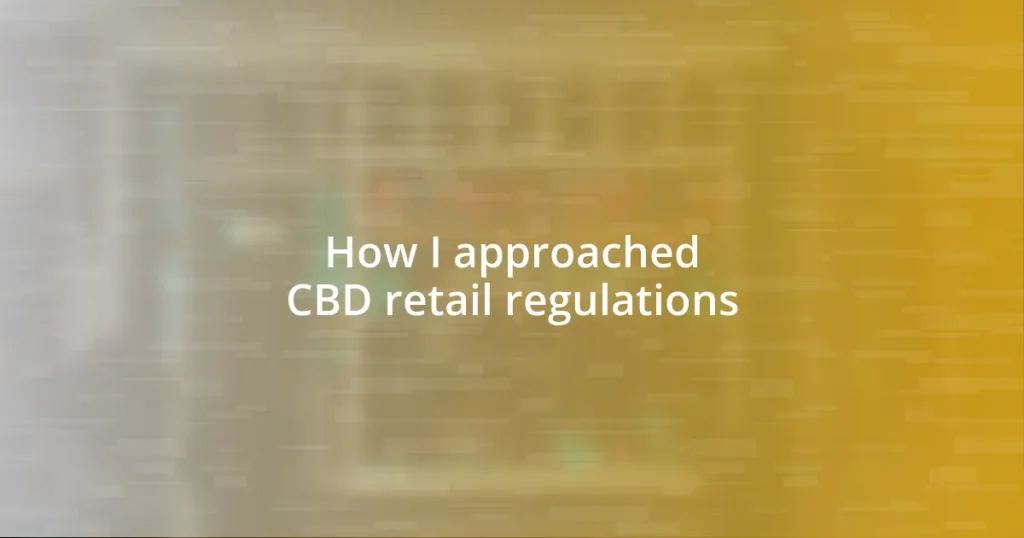Key takeaways:
- Understanding and managing dosage is crucial for the effectiveness and safety of medications; factors like timing and individual characteristics can significantly influence outcomes.
- Accurate dosages are essential as deviations can lead to reduced efficacy, increased side effects, or health risks; keeping a medication journal helps track effects and enhances communication with healthcare providers.
- Combining dosages efficiently requires careful observation of medication interactions and timing to improve adherence and well-being.
- Common mistakes include neglecting potential interactions, inconsistent dosing schedules, and underestimating the importance of precise measurements, all of which can lead to inconsistent health outcomes.
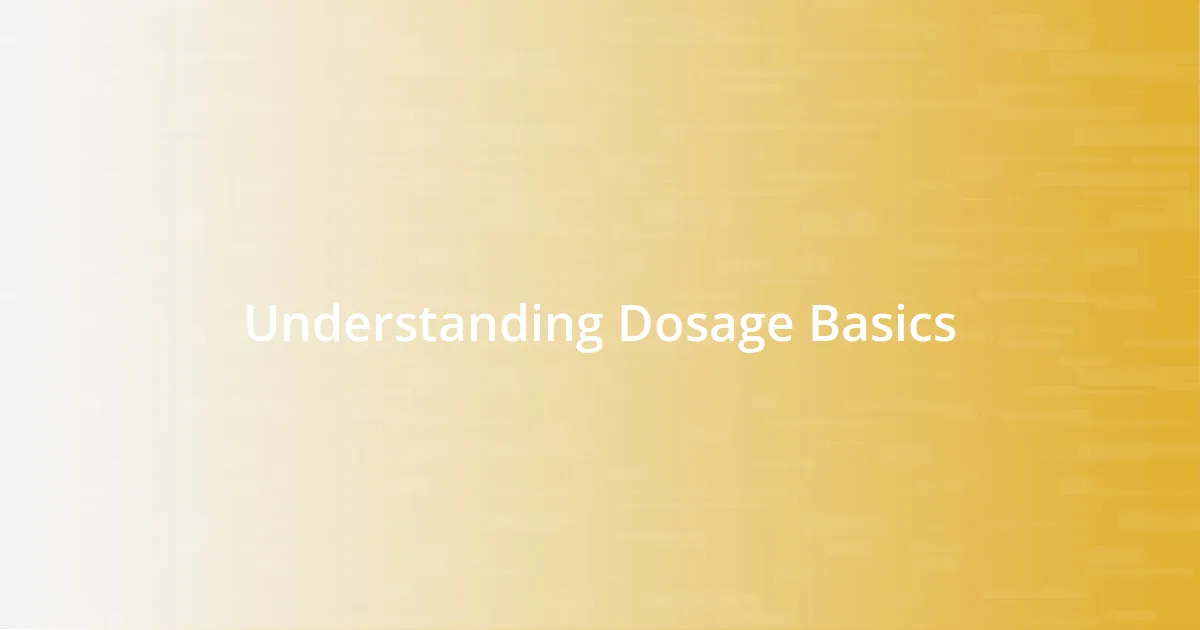
Understanding Dosage Basics
When it comes to medication, understanding dosage is crucial. I remember my first experience managing my own prescriptions—it felt overwhelming. Why is it that such small numbers can have such a significant impact on our health?
Dosage refers to the specific amount of medication prescribed to achieve the desired effect while minimizing risks. It’s not just about taking the right pill but about timing, frequency, and individual factors like weight or age. Have you ever paused to consider how each unique body can react differently to the same dosage?
In my journey, I’ve learned that dosage combines both science and a bit of personal intuition. For instance, I once adjusted my medication schedule based on how I felt throughout the day, and that minor tweak made a world of difference in managing my symptoms. Isn’t it fascinating how even small changes can lead to major breakthroughs in our well-being?
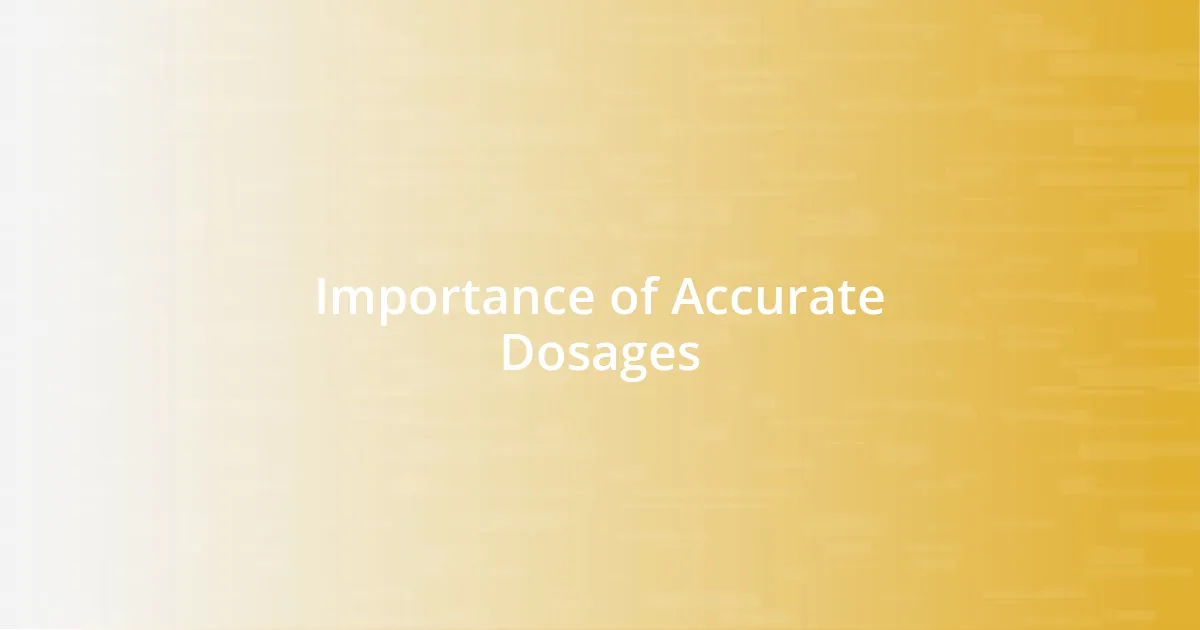
Importance of Accurate Dosages
Accurate dosages are vital for ensuring that medications work effectively and safely. In my experience, even a slight deviation can lead to unexpected side effects or diminished efficacy. For instance, when I once skipped a dose, I noticed my symptoms creeping back, reminding me just how crucial it is to adhere to a precise regimen.
Every individual is unique, and understanding the importance of accurate dosing can’t be overstated. I’ve had moments where I was reluctant to take my full dosage, thinking I could manage with less. Yet, I quickly realized that doing so not only impacted my recovery but also my overall mood and energy levels. It’s interesting how our perceptions can play tricks on us, sometimes making us underestimate the power of the prescribed dosage.
To illustrate how varying dosages can lead to different outcomes, let’s take a closer look at a comparison of different scenarios:
| Dosage Scenario | Outcome |
|---|---|
| Under-Dosing | Symptoms may return, overall effectiveness reduced. |
| Correct Dosing | Improved management of symptoms, enhanced well-being. |
| Over-Dosing | Increased side effects, potential health risks. |

My Personal Journey with Dosages
As I navigated the complexities of combining dosages, I found myself reflecting on how personal experiences shape our understanding of medication. There was a time when I was prescribed two different medications to manage my condition, and I felt a sense of anxiety whenever it came time to take them together. I worried about how they would interact and if I was truly doing the right thing for my health. That fear pushed me to become more proactive in researching both medications, leading to a much better grasp of how dosage adjustments could potentially affect me.
- This self-education transformed my anxiety into empowerment.
- I started keeping a medication journal, noting my feelings and any side effects after taking my doses.
- Over time, I gained confidence in my decisions and communicated more effectively with my healthcare provider.
Interestingly, I discovered that a careful review of my records helped me identify patterns that were incredibly enlightening. For example, I realized that one of the medications made me feel groggy when taken too close to bedtime. It’s those little insights that are often overlooked but can have such a profound impact on our daily lives and well-being.

Combining Dosages for Efficiency
Combining dosages can significantly enhance the overall efficiency of managing health conditions. I remember a particular instance when my doctor recommended I take two medications that seemed completely different but worked synergistically for my symptoms. After a period of trial and error, I found that taking them at the same time not only simplified my routine but also amplified their effectiveness—something I never anticipated.
Have you ever felt overwhelmed managing multiple medications? I certainly have. There were days when I’d stare at the pill bottles, stressed about the timing and interactions between the dosages. However, once I started aligning them according to my daily schedule, I felt a weight lifted off my shoulders. This small adjustment made my medication regimen more manageable and my mood noticeably brighter.
Looking back, I can’t help but appreciate how combining dosages taught me the importance of timing and consistency. The experience forced me to listen closely to my body and track how I felt at different times of the day. It became a learning journey. By observing how the medications interacted, I realized that timing was just as crucial as the dosages themselves, solidifying the link between thoughtful management and improved health outcomes.
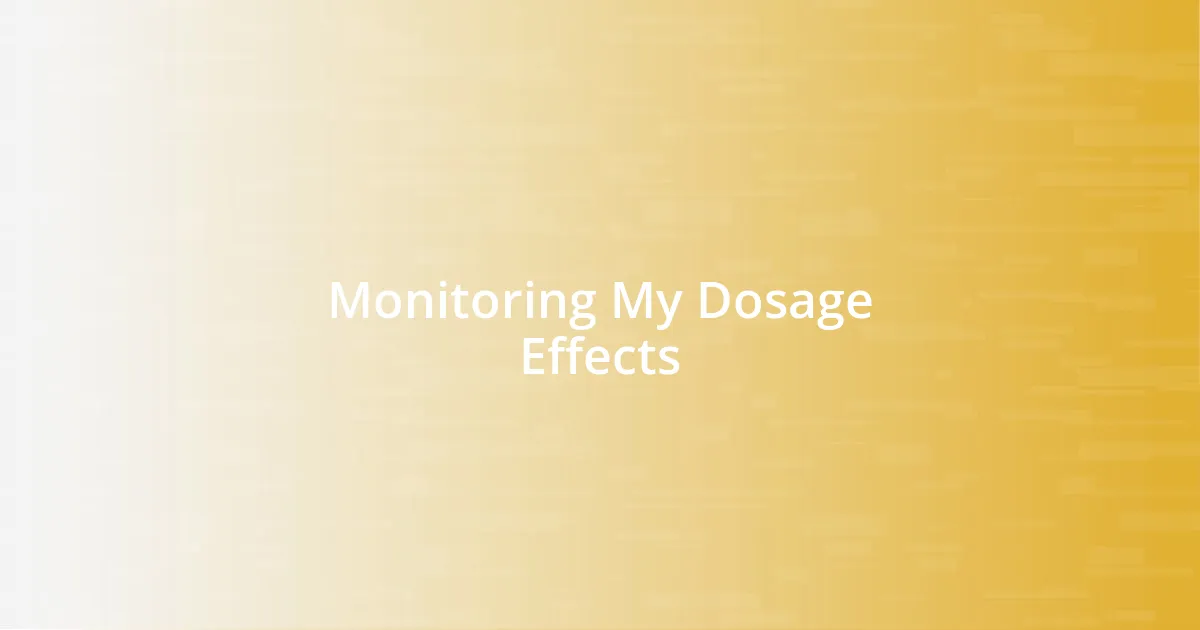
Monitoring My Dosage Effects
Monitoring how my dosages affect me has become an enlightening journey. I vividly recall the day I started feeling more hyper than usual after increasing one particular dosage. It prompted me to jot down my thoughts and mood changes in my medication journal. Have you ever noticed how insightful it can be to track the highs and lows of your mental and physical health? For me, connecting these observations to specific dosages gave me a clearer picture of their impact.
As I continued this practice, I found myself more in tune with my body. There was a week when I felt unusually fatigued, and by revisiting my entries, I realized the combination I was taking was indeed taking a toll on my energy levels. This realization can be a bit daunting, can’t it? But it also empowered me to discuss these effects openly with my healthcare provider, fostering a collaborative approach to adjusting my treatment plan.
Small changes within my monitoring routine also made a big difference. For instance, changing the time I took my medications allowed me to notice how my energy fluctuated throughout the day. It was fascinating to observe how even slight variations could lead to significant shifts in how I felt—each detail was a piece of my health puzzle. That meticulous attention to my dosage effects not only boosted my confidence but transformed my relationship with medication into a more positive, proactive experience.

Common Mistakes to Avoid
Reflecting on my journey with combining dosages, one common mistake I encountered was neglecting to consider potential interactions between medications. There was a time when I took an over-the-counter supplement alongside my prescribed medications, and I didn’t realize until later that it could affect their absorption. Have you ever experienced a moment when you wish you had double-checked something? I learned that it’s essential to consult with a healthcare professional before adding anything new, no matter how harmless it may seem.
Another misstep I made was not sticking to a consistent schedule with my dosages. I sometimes thought it was okay to take my medications at varying times, as long as I got them all in. However, I quickly discovered this led to a rollercoaster of effects, leaving me feeling confused and inconsistent. I wonder if you’ve faced similar challenges? Establishing a routine made all the difference; it enhanced my understanding of how each medication impacted my day.
Lastly, I often underestimated the importance of proper dosage measurements. Early on, I occasionally took what I thought was a “close enough” amount, figuring it wouldn’t make a significant difference. To my dismay, I experienced fluctuations in my mood and health that were tied directly to those inconsistencies in dosing. Have you ever noticed how seemingly small errors can snowball into larger issues? Precision with each dose has led to more stable outcomes and a greater sense of control over my health.
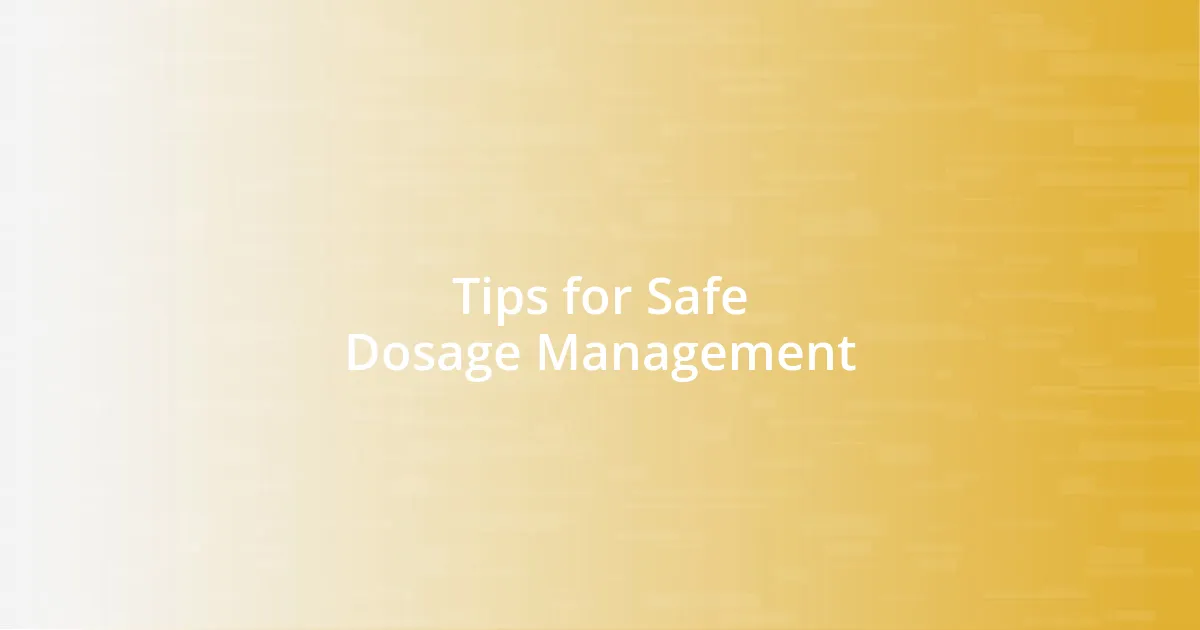
Tips for Safe Dosage Management
When it comes to safe dosage management, I always emphasize the importance of clear communication with healthcare providers. There was a time I hesitated to share how a new combination was affecting me, thinking it was trivial. Looking back, I realize that every detail matters. Don’t you think it feels empowering to voice your experiences? It creates a partnership that can lead to more tailored medication plans.
Keeping a medication diary can be a game-changer. I remember starting mine on a whim, motivated by a particularly tough week. Logging my daily experiences helped me see patterns that I would have otherwise overlooked. Have you ever tried it? It’s surprising how much clarity can come from simply writing down how you feel after each dose. This practice not only increased my awareness but also armed me with information for my medical appointments, allowing for more informed discussions.
Lastly, I learned to be wary of online advice about dosages, even when those tips seem harmless. At one point, I experimented with what I read on a forum, believing it would enhance my treatment. It was a mistake that left me feeling uneasy for days. Has that ever happened to you? It taught me that trusted sources are vital; relying on healthcare providers for guidance will always be my go-to method for safe dosage management.





